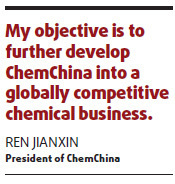Photo
'Few words, but many deeds' counsels ChemChina president
By Wan Zhihong (China Daily)
Updated: 2010-01-09 07:45
 |
Large Medium Small |

Ren Jianxin's rise began with a 10,000 yuan loan 26 years ago...
Despite being one of China's most renowned entrepreneurs, Ren Jianxin does not court publicity in the same fashion as many of his contemporaries. As the full-time president of the China National Chemical Corp (ChemChina), he lacks the opportunity to regularly play golf or tennis but he does though manage a daily 5 km walk to his office as part of his personal fitness regime. He is also fond of reading, especially biographies and Mao Zedong anthologies.
Giving a little insight into his lifestyle and personal values, Ren, the most senior executive at China's major chemical producer, says: "These are both simple hobbies, but are very helpful to me and I observe them faithfully. Success is the province of those who persevere. It is the same in your personal life as it is in business."
Ren, 52, found himself forced into spotlight once he struck a deal with a US private equity company, the Blackstone Group, to become a strategic investor in a subsidiary of ChemChina - the China National BlueStar (Group) Corp. This was back in 2007 and marked the first time a State-owned company had invited a foreign business to take on such a role.
Despite this milestone, he remains low-key and seldom accepts interviews or appears in public. "Few words, but many deeds. This is my discipline," he says to China Daily in an exclusive interview.
Established in 2004, ChemChina is a relative newcomer compared to many of the other chemical companies in the country. Following a series of mergers and acquisitions, it is now the leading chemicals producer in China, with sales revenue and total assets both in excess of 100 billion yuan.
It is hard to imagine that BlueStar, now a major subsidiary of ChemChina, was set up by Ren 26 years ago with a loan of just 10,000 yuan.
Commenting on the success of ChemChina, Ren typically gives little away, saying only that the growth of the company reflects well on the restructuring of China's chemical industry. He says: "My objective is to further develop ChemChina into a globally competitive business."
Overseas strategy

Ren has gained considerable notoriety for his success in overseas acquisitions over recent years. For him, overseas markets will play an increasingly important role in future growth of ChemChina.
"We will make continuous efforts to expand our overseas business," he says.
Beijing-based ChemChina currently has four overseas subsidiaries. In 2006, one of its subsidiaries, BlueStar, acquired the French-owned Adisseo Group, a leading global animal nutrition feed firm, specializing in the production of methionine, vitamins and biological enzymes. The deal boosted ChemChina's methionine production capacity, making it the second largest producer in the world.
In the same year, BlueStar also acquired the organic silicon business of another French company, Rhodia, The deal included taking ownership of all of Rhodia's patents, manufacturing equipment and distribution channels, as well as the company's sulfide business. The acquisition has also raised BlueStar's organic silicon business to the number second position in the world.
"The two deals clearly demonstrate our business focus. We aim to be a leading company in the new materials and specialty chemical products sector," says Ren.
In October 2008 ChemChina completed its stake transfer deal with the Blackstone Group, which saw the US private equity company pay $600 million for a 20 percent share in BlueStar.
Commenting on the deal, Ren says: "This arrangement will help BlueStar improve its technology and management levels, making our company ever more multinational.
"In order to successfully achieve overseas development, a company has many options. It can choose to form cooperation agreements with overseas partners. It can also open plants overseas.
"For ChemChina, I think our best route is to make acquisitions. Through acquisitions we can have access to larger markets and more advanced technology. It is also a valuable route for securing new talent."
Addressing development of ChemChina's foreign subsidiaries in recent years, Ren highlights the importance of cultural exchange, saying: "In all of our companies we show respect to different cultures, which I believe is key to success."
One such cross-cultural initiative sees BlueStar holding an annual summer camp for the children of its employees. Last year's camp welcomed the first group of children from its foreign staff.
"The camp is a good opportunity for all of our children to learn from different cultures. Children are the future of our business," says Ren.
Surviving adversity

Although less severe than 2008, 2009 proved another difficult year for the chemical industry due to a shortfall in demand. "To succeed during such a time one must strive to make innovations and shoulder greater responsibilities," says Ren.
In the wake of the financial crisis, meetings have become a way of life for Ren. He says: "As soon as we realized the full implications of the crisis, I held individual meetings with the management of our company's 118 subsidiaries. The question we all discussed was exactly the same: 'How do we survive the economic downturn?'
"After in-depth evaluation, we adjusted our operational policy and began to focus more on sales and internal management development."
Last year the company twice made significant structural changes in its investment schedule, reducing proposed expenditure in this sector by 7.48 billion yuan. The company shifted its focus onto management improvements, technology upgrades and human resource optimization.
Ren believes consolidation in China's chemical industry will accelerate throughout the period of downturn. "We should take advantage of this to further expand our business," he says.
Ren also believes that energy-efficient and environmentally friendly products will become ever more important throughout the world. This, he believes, is where ChemChina should focus on over the next decade.
He says: "We are committed to a long-term strategy of developing new materials and specialty chemical products."
As part of this policy, ChemChina has already consolidated its business into six units - advanced chemical materials and specialty chemicals, oil processing and refining products, chlor-alkali chemicals, agrochemicals, rubber products and chemical equipment.
This business restructure is in line with the development of China's chemical industry. Ren believes. He says: "China is now the world's largest chemicals producer. In the high-tech sector of the industry, though, the country still lags far behind the developed countries."
Ren's plan for each unit is the same - he wants to see them established as the largest of their kind in China and one of the world's top three. The company is also planning to launch a series of events with regard to management development, which is not only an adjustment of internal structure but enhancement of the company's comprehensive strength, he says.








